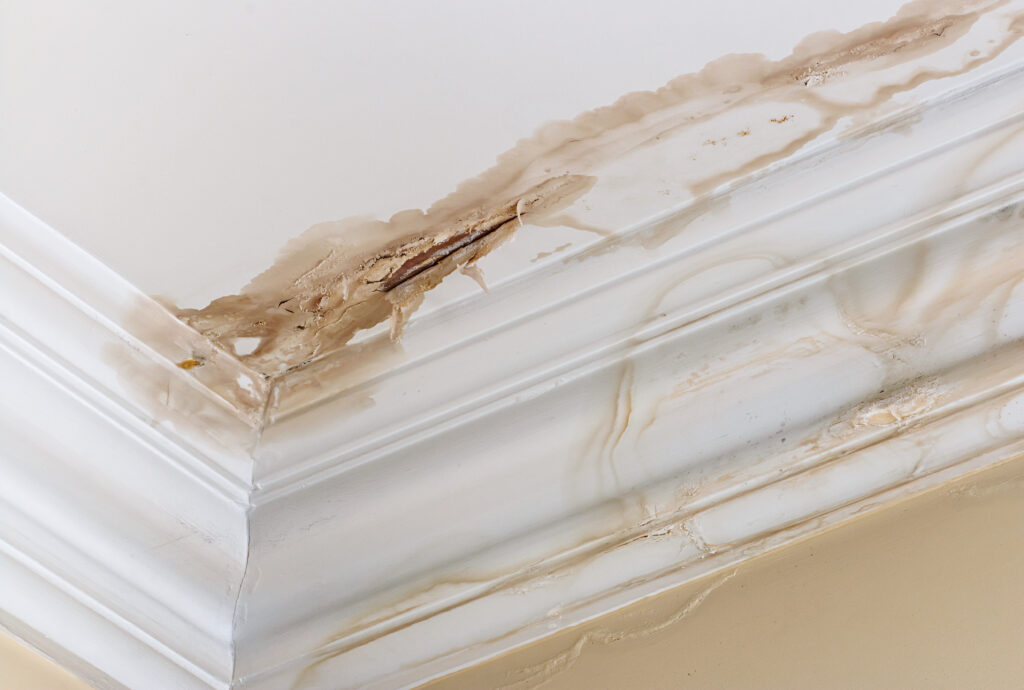As a tenant, maintaining your home can sometimes feel like a balancing act. While some issues are obvious—like a broken window or a malfunctioning boiler—others, such as water leaks, can be more subtle and harder to detect. Unfortunately, if left untreated, a water leak can lead to significant damage, increased utility bills and even health risks from mould.
In this blog, we will help you identify the signs of a water leak, guide you on what to do next and provide tips for finding hidden leaks. Being proactive in spotting and addressing leaks can help you avoid unnecessary stress and ensure that your property remains in good condition.

Signs of a Water Leak
Water leaks can often be challenging to spot, especially if they occur behind walls or under flooring. However, there are several tell-tale signs that can help you identify a potential problem before it escalates.
Higher Than Usual Water Bills
One of the most straightforward indicators of a water leak is an unexplained spike in your water bill. If you’ve been using your water as you normally would but notice a significant increase in your monthly or quarterly bill, it could be a sign that water is escaping somewhere in your property. Even a small, slow leak can waste gallons of water over time, which will directly impact your bill. Thames Water estimates that a dripping tap alone can waste up to 5,500 litres a year!
Strange Noises in the Plumbing
Another common sign of a leak is unusual noises coming from your plumbing system. If you hear hissing, dripping or rushing water sounds, particularly when no taps or appliances are running, there may be water escaping from your pipes. Similarly, gurgling sounds in your toilet or pipes could indicate an issue that needs attention.
Damp or Mouldy Smells
Leaks don’t always make themselves known through visible damage. Sometimes, the first clue is the distinctive smell of damp or mould. If you notice a musty odour in your home, especially in enclosed spaces such as cupboards or under the sink, it could mean water is pooling somewhere out of sight. This could lead to mould growth, which poses health risks, particularly to individuals with respiratory issues or allergies.
Unexplained Wet Patches or Discolouration
Wet patches on your walls, ceilings or floors are often the first visible sign of a water leak. Discolouration or bubbling paint or wallpaper is a clear sign that moisture is accumulating behind the surface. This is especially common with leaks from pipes hidden inside walls or ceilings. Don’t ignore these patches—what may start as a small mark could quickly lead to larger structural issues.
What To Do If You Suspect a Water Leak
If you think you have a water leak, it’s essential to take immediate action to prevent further damage. As a tenant, you should:
Report the Issue to Your Landlord or Property Manager
Your first step should be to inform your landlord or property manager as soon as you spot any signs of a leak. It is their responsibility to ensure that repairs are carried out in a timely manner. Provide as much detail as possible about what you’ve observed, including any changes to your water bill or unusual noises. Documenting the issue with photos or videos can also help.
Shut Off the Water Supply If Necessary
If the leak appears to be serious or you are experiencing a flood, you may need to shut off the water supply to the property until the issue can be addressed. Most homes have a stopcock, usually located under the kitchen sink or near the front door, which can be used to cut off the water supply in an emergency.
Avoid DIY Repairs
While it may be tempting to try and fix the leak yourself, this is not advisable unless you have professional plumbing experience. Attempting a DIY repair could worsen the problem and as a tenant, it is your landlord’s responsibility to manage any repairs. In most cases, professional plumbers will be required to handle the issue efficiently and safely.
How to Find Hidden Water Leaks
Some leaks are more obvious than others, but hidden leaks can be particularly tricky to locate. Here are some ways to uncover those elusive leaks before they cause too much damage.
Check Your Water Meter
One effective way to confirm whether there’s a leak in your home is by using your water meter. First, ensure that all water-using appliances and taps are turned off. Then, take a reading of your water meter and leave it for an hour or two without using any water. When you return, check the meter again—if the reading has changed, this suggests that water is escaping somewhere.
Look for Lush Patches of Grass
If your property has a garden, an unusually lush or damp patch of grass could indicate an underground leak, particularly from external pipes. While it’s normal for some areas to be more fertile than others, if you notice a specific area that remains soggy even during dry weather, it’s worth investigating.
Inspect Your Boiler and Radiators
Leaks can also occur within your heating system. If your boiler loses pressure frequently or there are cold spots on your radiators, this could be a sign of a leak in your central heating system. Regular maintenance checks can help catch these issues early.
Keep an Eye on Your Home’s Structure
As well as checking for damp or wet patches inside your home, it’s a good idea to inspect external walls and foundations for signs of cracking or water seepage. Although this type of damage is often associated with larger, structural issues, it can also be caused by water leaks that have gone unnoticed for an extended period.
Don’t Delay—Spot and Report Leaks Early
Water leaks, whether small or large, can lead to significant damage if not addressed promptly. By staying vigilant and learning to recognise the signs of a potential leak, you can protect your home from costly repairs and keep your water bills under control. If you do spot any signs of a leak, don’t hesitate to report it to your landlord or property manager immediately.
At Belvoir Tunbridge Wells, we are committed to helping tenants maintain their homes and avoid unnecessary stress. If you have concerns about a water leak or any other issue in your rental property, please don’t hesitate to reach out to us for guidance and support.










